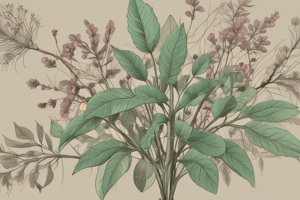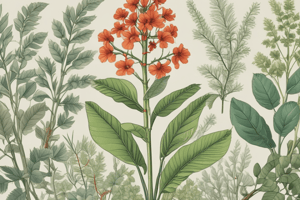Podcast
Questions and Answers
What is the primary purpose of respiration in plants?
What is the primary purpose of respiration in plants?
- To regulate growth hormones
- To produce glucose
- To produce ATP (correct)
- To absorb nutrients from the soil
How do plants absorb essential elements like nitrogen and phosphorus?
How do plants absorb essential elements like nitrogen and phosphorus?
- Through the atmosphere
- Through their leaves
- Through their flowers
- Through specialized cells called root hairs (correct)
Which of the following factors play a role in regulating plant growth and development?
Which of the following factors play a role in regulating plant growth and development?
- Moon phases
- Wind speed
- Planetary alignment
- Nutrient availability (correct)
What are some of the defense mechanisms that plants have developed to cope with stressors?
What are some of the defense mechanisms that plants have developed to cope with stressors?
How has agricultural biotechnology revolutionized farming practices in recent years?
How has agricultural biotechnology revolutionized farming practices in recent years?
What is a critical component of agriculture biology according to the text?
What is a critical component of agriculture biology according to the text?
What is the primary function of photosynthesis in plants?
What is the primary function of photosynthesis in plants?
Where does photosynthesis primarily occur in plants?
Where does photosynthesis primarily occur in plants?
What is the role of respiration in plants?
What is the role of respiration in plants?
Which of the following is NOT a physiological process crucial for plants?
Which of the following is NOT a physiological process crucial for plants?
What are the pigments responsible for absorbing light energy during photosynthesis?
What are the pigments responsible for absorbing light energy during photosynthesis?
Which of the following substances is NOT directly involved in photosynthesis?
Which of the following substances is NOT directly involved in photosynthesis?
Study Notes
Exploring the Science of Agriculture and Plant Physiology
From the soil to our plates, agriculture is a complex and interconnected field that relies on a deep understanding of plant biology and physiology. As we delve into the intricate world of agriculture biology, let's explore the fascinating processes that make plants thrive and the scientific principles that help us advance modern farming techniques.
Plants: The Living Machines of Agriculture
Plants are the primary producers in our ecosystem, converting sunlight, carbon dioxide, and water into the chemical energy that sustains all life on Earth. They are sophisticated organisms with a diverse array of physiological processes, such as photosynthesis, respiration, and nutrient cycling, which make them the backbone of agriculture.
Photosynthesis: The Foundation of Plant Life
Photosynthesis is the process by which plants convert light energy into chemical energy, which they store in the form of glucose. This glucose is then used to produce new plant tissue, fueling growth and development. Photosynthesis occurs in specialized cells called chloroplasts, which contain pigments such as chlorophyll, which absorb light energy and catalyze the photochemical reactions that produce glucose and oxygen.
Respiration: The Energy Releasing Process
While photosynthesis produces energy, the process of respiration releases energy stored in organic molecules. In plants, respiration occurs in all cells, not just chloroplasts, and involves breaking down glucose to produce ATP, which can be used for various cellular processes.
Nutrient Acquisition: How Plants Obtain Nourishment
Plants require a diverse set of chemical elements for growth, such as nitrogen, phosphorus, potassium, and calcium. Plants absorb these elements from the soil through their roots, primarily through specialized cells called root hairs. Once absorbed, plants transport these nutrients through their vascular tissue, a network of xylem and phloem, to the rest of the plant.
Plant Growth and Development
Plant growth and development are regulated by various factors, including light, temperature, water, and nutrient availability. Plant hormones, such as auxins, gibberellins, cytokinins, abscisic acid, and ethylene, also play a crucial role in regulating plant growth and development.
Plant Responses to Stress and Disease
Plants are constantly exposed to various stressors, such as drought, extreme temperatures, and pests. Plants have developed sophisticated defense mechanisms to cope with these stressors, including the production of protective compounds, such as antioxidants, and the activation of stress-responsive genes.
Agriculture Biotechnology: Engineering Plants for Improved Crop Yields
In recent years, agriculture biotechnology has revolutionized farming practices by allowing researchers to modify plant genes to improve crop yields, increase resistance to pests and diseases, and reduce the need for chemical fertilizers and pesticides. Techniques such as genetic engineering, marker-assisted selection, and genome editing have offered exciting opportunities to improve crop productivity and sustainability.
In conclusion, understanding plant physiology is a critical component of agriculture biology. As we continue to explore these fundamental processes, we can develop more efficient, sustainable, and environmentally friendly methods to feed our growing global population. By harnessing the power of biology and technology, we can create a better future for agriculture and the planet.
Studying That Suits You
Use AI to generate personalized quizzes and flashcards to suit your learning preferences.
Description
Test your knowledge on the intricate world of agriculture biology, exploring plant physiology, photosynthesis, respiration, nutrient acquisition, growth and development, plant responses to stress, and agriculture biotechnology. Learn about the scientific principles that underpin modern farming techniques.




